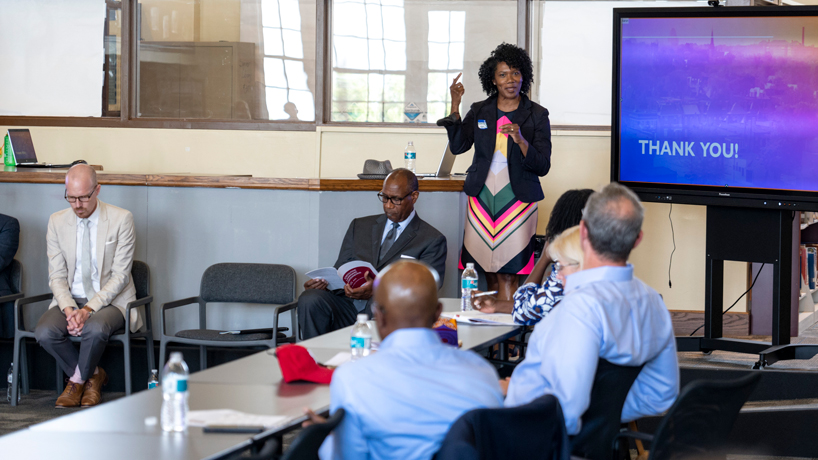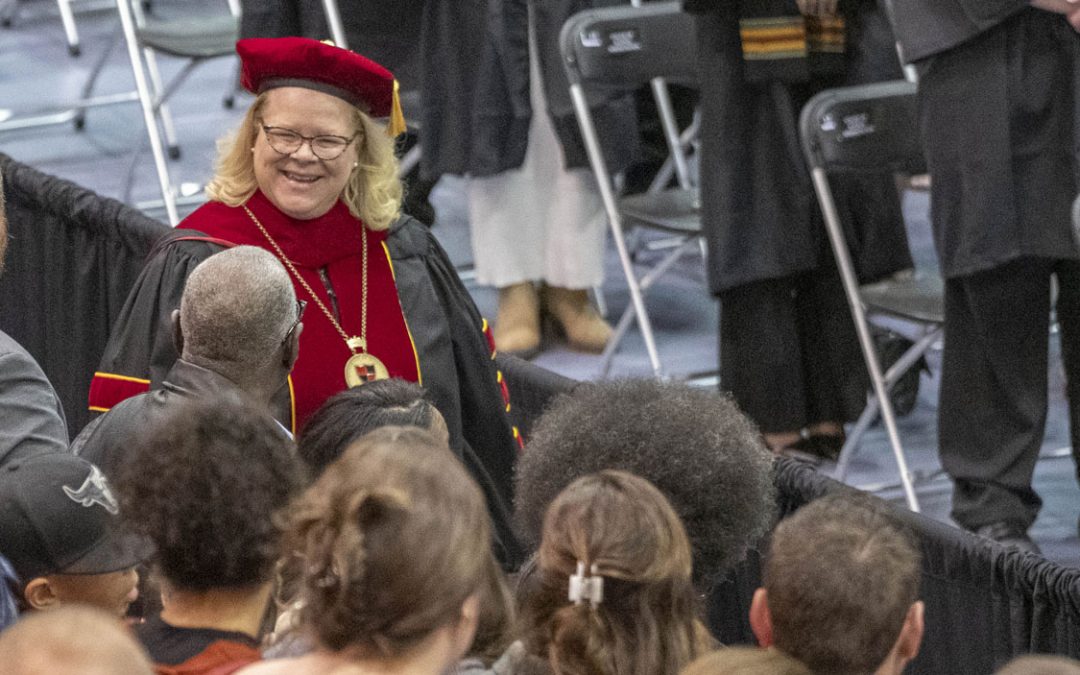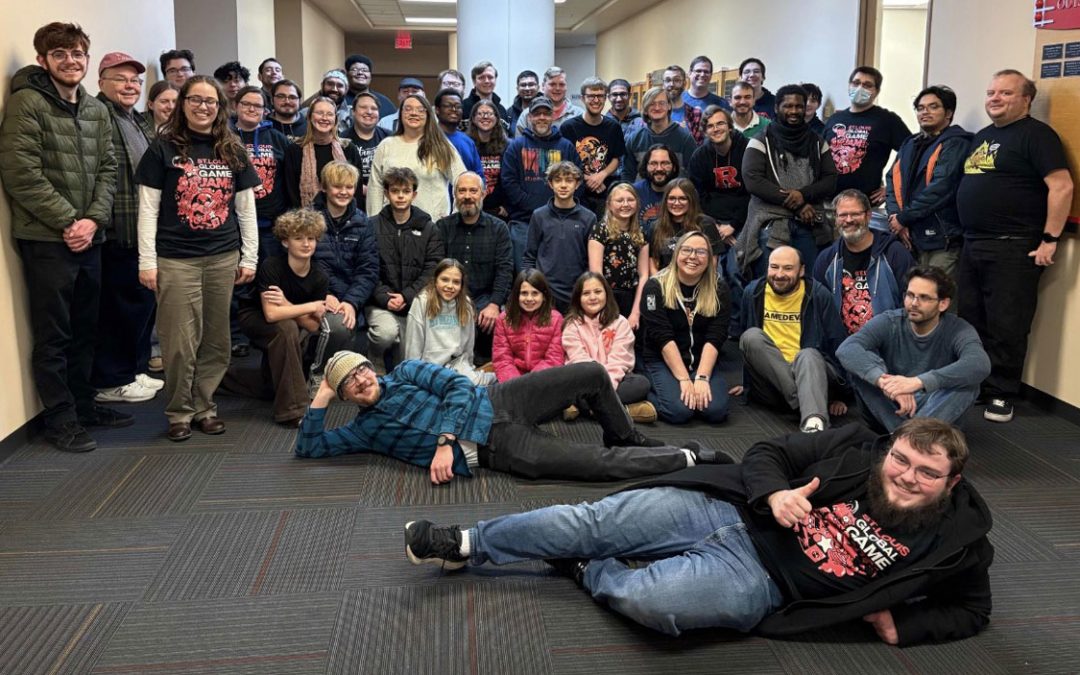
St. Louis Anchor Action Network Director Stefani Weeden-Smith speaks at an executive learning event for local leaders in June at Sumner High School. (Photo by August Jennewein)
Over the past year, a coalition of some of the St. Louis community’s largest corporations and organizations has worked to build a new framework for more equitable hiring, purchasing and investment practices throughout the region, with the hopes of fostering a future where everyone can thrive.
In October 2021, the St. Louis Anchor Action Network launched a startup phase, funded in part by a grant from the Missouri Foundation for Health, and appointed its first director, Stefani Weeden-Smith. Today, with a strong foundation in place and significant early successes to build upon, the Network is looking ahead to driving positive impact at scale in 2023 and beyond.
The group has established an initial focus area of 22 ZIP codes in St. Louis city and county that have long suffered from the results of systemic racial and spatial inequities, resulting in 24.1% of the population currently living below the poverty line. Network partners today announced a collective initial goal of increasing employment and purchasing in these neighborhoods by 10% by the end of 2023, which would result in a projected $50 million increase in direct investment. To reach this collective goal, Network partners have been working to establish specific hiring and purchasing strategies to best match their operations and most relevant investment opportunities.
“We’ve made important progress in our first year, directly engaging with people across our key focus areas, learning where our support can be most effective, then working with our members to drive positive change,” Weeden-Smith said. “From career expos to lunch-and-learn events, we have engaged with hundreds of community residents and small business owners, and we’re starting to see those actions pay off in job placements and increased investments. At the same time, this groundwork is paving the way for even greater impact in the months and years ahead. Our initial goal for 2023 is substantial, but we see it as the next milestone in our ongoing efforts to support equitable opportunity across the region.”
The Network’s initiatives have led to positive results for residents and small business owners in the focus neighborhoods, including Chef Everett R. Wells III, who owns Destiny Catering and Sauce Development. Wells connected with SSM Health at a Network event in 2021 and now provides contracted catering services to the health care organization.
“Partnering with the St. Louis Anchor Action Network has been a great door opener for my company,” Wells said. “We feed corporate customers and the general public, train culinary interns through their final reaches for certification and have established customers and community contacts through the Network. The future looks promising and strong through this channel of balance for the city and small businesses.”
The Network is a coalition of St. Louis “anchor institutions” that have deep roots in the community and the resources to drive change and sustained investment. Members include leaders in health care, higher education, and the public and private sectors – committed to working together to help the region realize the social and economic value of investing in equity. The University of Missouri–St. Louis and Edward Jones are co-leading the Network and providing resources and staffing to support its growth and impact.
“The University of Missouri–St. Louis is proud of the work that we’ve accomplished with our partners in the St. Louis Anchor Action Network,” Chancellor Kristin Sobolik said. “We are progressing toward sustainable changes in our region that will reverse trends and practices that have held back too many people who haven’t been welcomed to share in our collective prosperity. All of our institutions have a role to play, working with residents and community leaders to create opportunities so that everyone has a chance to thrive, and we’re committed to meeting that challenge.”
“As part of our purpose to partner for positive impact, Edward Jones is committed to advancing the Network’s mission to create a more inclusive regional economy,” Edward Jones Managing Partner Penny Pennington said. “As we continue to build momentum, our members are focused on investing in talent and businesses in neighborhoods that have suffered from disinvestment and improving employment and purchasing strategies across our organizations. By harnessing the collective resources of our region’s anchor businesses and institutions, we can help build a stronger and more equitable community.”
In the last year, the Network has grown from 11 to 16 members, now including Ameren, BJC HealthCare/Christian Hospital, Equifax, Federal Reserve Bank of St. Louis, Great Rivers Greenway, Harris-Stowe State University, Mercy, Missouri Botanical Garden, Saint Louis University, Saint Louis Zoo, SSM Health, St. Louis Community College, Washington University in St. Louis and Webster University. Greater St. Louis, Inc. and the St. Louis Regional Business Council serve as regional partners with the Network providing guidance and supporting outreach and community engagement efforts. The Network works in coordination with Greater St. Louis, Inc.’s STL 2030 Jobs Plan and aligns with the Regional Business Council’s Black and Brown Executive Leadership program and STL.works.
Looking ahead to 2023, the Network is focused on working to achieve the collective initial goal of increasing purchasing and hiring by 10% in the focus footprint, expanding career and hiring expos, increasing community investments and building capacity to support continued growth and impact.
Initial results of the Network’s startup year and preliminary initiatives include:
- Engaged with more than 125 community partners to develop the Network’s action plan.
- More than 340 residents registered for three career and hiring expos.
- More than 50 job applicants hired through the Network’s initiatives to date with other applicants in the pipeline.
- Fifty small businesses connected with Network members for opportunities to bid for contracts.
- Over 13,000 businesses included in our searchable community business tool.
- Eighteen organizations engaged in hiring and purchasing working groups and programmatic initiatives.
- Anchor institutions have dedicated significant resources and staffing to build the Network’s framework, share best practices and accelerate learning and adoption of new practices.
- Executive leaders and key representatives from each member organization have participated in community listening sessions.
- The Network hosted leaders from across the region for an executive learning experience in The Ville neighborhood.














